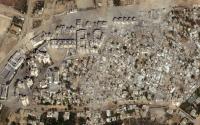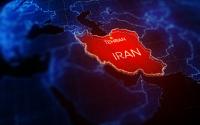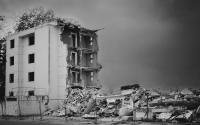Common Dreams / Published on Tuesday, May 15, 2007 by the Boston GlobeBrian MacQuarrie
Boston University professor Andrew J. Bacevich has been a persistent, vocal critic of the Iraq war, calling the conflict a catastrophic failure. This week, the retired Army lieutenant colonel received the grim news that his son had been killed on patrol there.
 First Lieutenant Andrew J. Bacevich , 27, of Walpole, died Sunday in Balad of wounds he suffered after a bomb explosion, the military said yesterday. The soldier, who graduated from BU in 2003 with a degree in communications, is the 56th service member from Massachusetts to be killed in Iraq.
First Lieutenant Andrew J. Bacevich , 27, of Walpole, died Sunday in Balad of wounds he suffered after a bomb explosion, the military said yesterday. The soldier, who graduated from BU in 2003 with a degree in communications, is the 56th service member from Massachusetts to be killed in Iraq.
His father, a veteran of the Vietnam and Gulf wars, has criticized the war in his writings and described President Bush’s endorsement of such “preventive wars” as “immoral, illicit, and imprudent.”
A West Point graduate and former faculty member at both West Point and Johns Hopkins University, Bacevich joined the BU faculty in 1998 and teaches in the history and international relations departments. He has written books on US diplomacy and military power and has contributed op-ed pieces on the Iraq war to newspapers and periodicals.
In an op-ed column published March 1 in the Globe, Bacevich wrote that “our reckless flirtation with preventive war qualifies as not only wrong, but also stupid. Indeed, the Bush Doctrine poses a greater danger to the United States than do the perils it supposedly guards against.
“We urgently need to abrogate that doctrine in favor of principles that reflect our true interests and our professed moral values,” Bacevich wrote.
Katy Bacevich, 22, one of the soldier’s three sisters, recalled her brother as a born leader who answered a calling to serve his country. Andrew Bacevich joined the Army in July 2004 and had been stationed in Iraq since October with the Third Brigade Combat Team, First Cavalry Division.
“He felt it was an important thing to do, regardless of the war that was going on,” she said. Despite her father’s strong feelings about the conflict, Katy Bacevich said, “he never would discourage my brother from doing what he wanted to do.”
The family moved to Walpole in 1998 from the Maryland suburbs of Washington, D.C., she said.
A former military comrade of the elder Bacevich was shaken by the news yesterday.
Retired Major General William Nash served with Bacevich, also known as Skip, in Kuwait. “Service to country was obviously a family trait,” Nash said. “Skip was a great role model for young officers.”
BU professor William Keylor, who also teaches history and international relations, supervised final exams for one of Bacevich’s classes yesterday. He said faculty members were “devastated.”
“They knew how close the two Andys had been and, particularly those of us who have children, just identified so strongly with him,” Keylor said.
The students taking that final exam, Keylor said, were not told of their professor’s loss so as not to distract them from other finals. The course, called The American Military Experience, included discussion of the relationship between citizenship and the obligation of military service, according to BU’s website.
Professor Bacevich maintained contact with his son by e-mail, Keylor said. “Every time, the word was things are going well, no problems. Then I got a call from him last night with this terrible news,” Keylor added.
“He resembled his father so closely that, when you saw him, you immediately thought of Andy Sr.,” Keylor said. “His father and mother absolutely adored him.”
Keylor described the younger Bacevich, whom he had taught in a two-semester class on international relations, as a good student who wanted to follow in his father’s footsteps. “I had the impression of a very popular, likable, exuberant young man,” he said. The younger Bacevich had been enrolled in the Army ROTC at BU.
When interviewed by the Globe recently, Professor Bacevich had requested that his son’s service in Iraq not be mentioned — both to limit unwanted attention on his son and to separate the father’s professional opinion from the heavy personal stakes.
Behind that request, however, “I always had the impression that he was terribly proud of his son and the service he was providing,” Keylor said.
The elder Bacevich was sounding his warnings about the war at the time of the US-led invasion in March 2003. Bacevich wrote in the Los Angeles Times that month that “if, as seems probable, the effort encounters greater resistance than its architects imagine, our way of life may find itself tested in ways that will make the Vietnam War look like a mere blip in American history.”
Keylor said Bacevich appeared to come to his opinions about the Iraq war after much thought.
“He’s a very learned man, and I think that he studied the background to the war very carefully, and only came out with his strong opinions after he had really, really looked it over,” Keylor said. “He’s not the kind of guy who shoots from the hip.”
Bryan Bender of the Globe staff contributed to this report from Washington.






